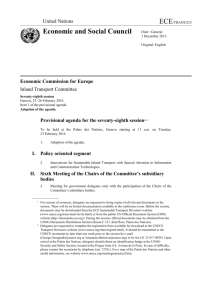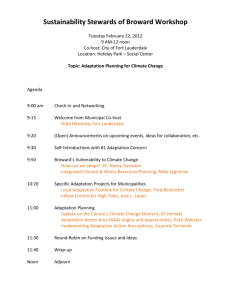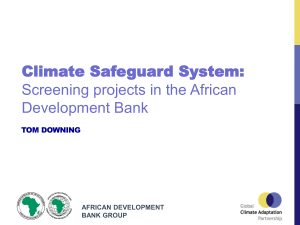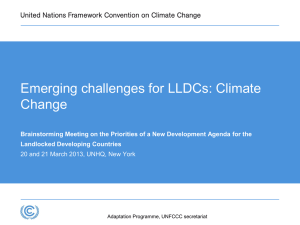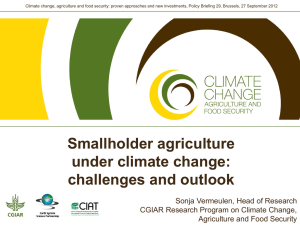DOC - unece
advertisement
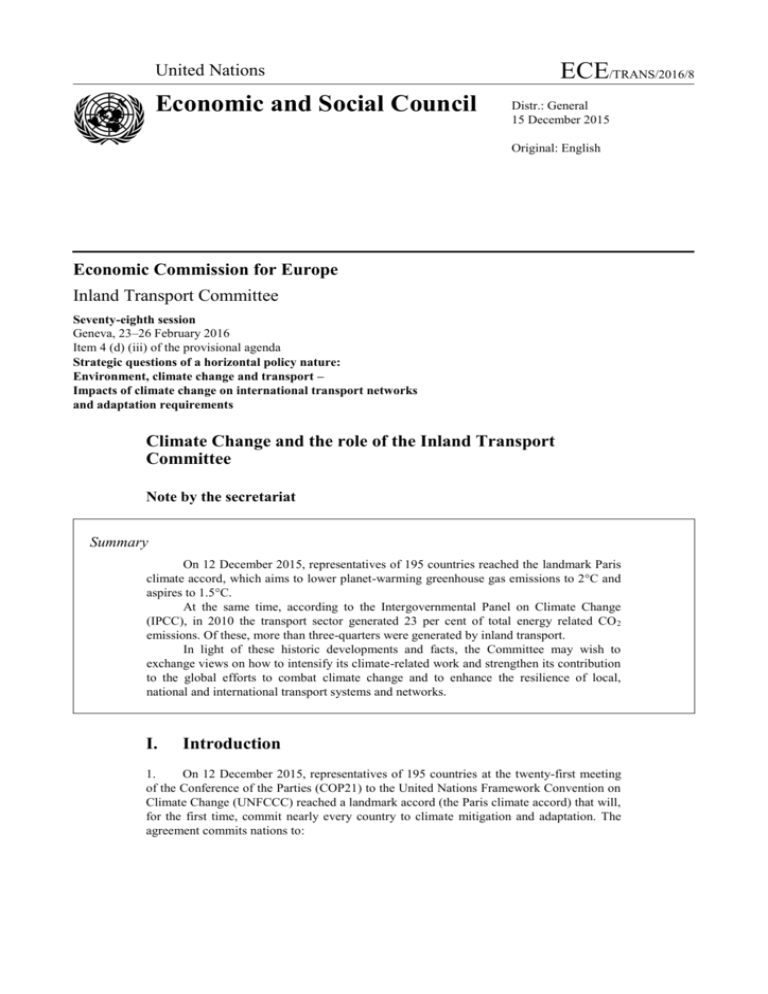
ECE/TRANS/2016/8 United Nations Economic and Social Council Distr.: General 15 December 2015 Original: English Economic Commission for Europe Inland Transport Committee Seventy-eighth session Geneva, 23–26 February 2016 Item 4 (d) (iii) of the provisional agenda Strategic questions of a horizontal policy nature: Environment, climate change and transport – Impacts of climate change on international transport networks and adaptation requirements Climate Change and the role of the Inland Transport Committee Note by the secretariat Summary On 12 December 2015, representatives of 195 countries reached the landmark Paris climate accord, which aims to lower planet-warming greenhouse gas emissions to 2°C and aspires to 1.5°C. At the same time, according to the Intergovernmental Panel on Climate Change (IPCC), in 2010 the transport sector generated 23 per cent of total energy related CO 2 emissions. Of these, more than three-quarters were generated by inland transport. In light of these historic developments and facts, the Committee may wish to exchange views on how to intensify its climate-related work and strengthen its contribution to the global efforts to combat climate change and to enhance the resilience of local, national and international transport systems and networks. I. Introduction 1. On 12 December 2015, representatives of 195 countries at the twenty-first meeting of the Conference of the Parties (COP21) to the United Nations Framework Convention on Climate Change (UNFCCC) reached a landmark accord (the Paris climate accord) that will, for the first time, commit nearly every country to climate mitigation and adaptation. The agreement commits nations to: ECE/TRANS/2016/8 “Holding the increase in the global average temperature to well below 2°C above preindustrial levels and to pursue efforts to limit the temperature increase to 1.5°C above preindustrial levels, recognizing that this would significantly reduce the risks and impacts of climate change;” (Article 2.1(a)) and to: “Increasing the ability to adapt to the adverse impacts of climate change and foster climate resilience and low greenhouse gas emissions development, in a manner that does not threaten food production;”(Article 2.1(b)). 2. Intended Nationally Determined Contributions (INDCs) are essentially the backbone of the Paris climate accord. Some countries focus only on mitigating carbon emissions, while others include measures of adaptation. Countries will be required to reconvene every five years, starting in 2020, with updated plans that would further reduce emissions. 3. Transport is a significant and growing contributor to global climate change. According to the latest figures of IPCC for 2010, the transport sector generated 23 per cent of total energy related CO2 emissions. Of these, more than three-quarters were generated by inland transport and 72.06 per cent (or more than 16 per cent of total) were emitted by road transport alone (UNFCCC, 2015). 4. It is evident that without improving the energy efficiency of inland transport, particularly road transport, achieving the 2°C or the more ambitious 1.5°C target will not be possible. This creates a range of challenges and opportunities for the Inland Transport Committee (ITC) and UNECE as a whole. 5. ITC contributes to climate change mitigation and adaptation in line with the provisions of UNFCCC and the Kyoto protocol, as well as decisions of the Economic Commission for Europe and ITC. The Annex to this document summarizes relevant mandates and decisions of ITC work. 6. Efforts to improve the quality of life and to contribute to the sustainable development of the region, including climate change mitigation and adaptation are central to the work of ITC and form key objectives of its programme of work and strategic frameworks. The following section includes an overview of the climate-related activities of the Committee. II. Climate change activities of the Inland Transport Committee 7. The ITC and its subsidiary bodies tackle climate change adaptation and mitigation by regulatory, analytical, policymaking, and technical assistance/capacity-building work. 8. The World Forum for Harmonization of Vehicle Regulations has been developing worldwide norms aimed at increasing the environmental performance and safety of vehicles. The World Forum is considering strategies for the automotive sector up to 2040 which could encompass: (a) Improved energy efficiency and the use of sustainable biofuels as a shortterm objective (2015); (b) The development and introduction into the market of plug-in hybrid vehicles as a mid-term objective (2015–2025); (c) The development and introduction into the market of electric vehicles as a long-term objective (2025–2040). (Normative) 2 ECE/TRANS/2016/8 9. The Climate Change Impacts and Adaptation for International Transport Networks report was produced by Group of Experts established to study this specific concern in the framework of the Working Party on Transport Trends and Economics (WP.5). It identifies where transport infrastructure and services will likely be most affected. To create the most up-to-date picture, the report reviews national initiatives, case studies and research projects as well as experiences on adaptation measures specific to various transportation modes. On the basis of this review, existing best practices in national policies for risk management and resilience enhancement are identified. For example, coastal transport infrastructure and services such as ports or other coastal transport hubs will be severely affected by a mean rise in sea level, warmer water temperatures, higher intensity of storms and storm surges, and potential changes in the wave regime. 10. For Future Inland Transport Systems Project (ForFITS) was completed in 2013. The project was funded by UNDA, and managed by the five United Nations regional commissions with UNECE as the lead implementation agency. The tool enables the assessment of inland transport scenarios and transport policy choices with the goal of reducing CO2 emissions in transport. It projects transport activities, energy use and well‐to‐ wheel CO2 emissions over user-specified timespans. The ForFITS tool helps governments and municipalities to assess the amount of CO2 emitted by the inland modes of transport. Then, scenario building allows for the selection of ‘the most appropriate transport policies’ and a mitigation plan. Pilot countries and cities are Chile, Ethiopia, France, Hungary, Montenegro, Thailand, Tunisia, Sao Paolo and Lyon. It is expected that the ForFITS tool will be regularly used in environment performance reviews of the transport sector at the national or city level. A UNECE-wide data collection has been launched in order to use the tool for the analysis of the links between transport activities and sustainable policies. The project results include but are not limited to: (a) Global Status Report on CO2 emissions from inland transport with information on statistics, national mitigation policies and modelling tools; (b) The development of the ForFITS tool for assessment of inland transport CO 2 emissions, including a user detailed manual, freely available on and downloadable from the UNECE website; (c) Regional and national awareness raising and capacity-building workshops, as well as training seminars on how to use ForFITS; (d) Applied national and city studies of ForFITS: Georgia (2014), Kaunas (2014), Lithuania (2014), Belarus (2015), Tajikistan (2015). III. Remaining challenges and the way forward 11. Although aviation and maritime transport contribute a considerably smaller fraction of CO2 emissions than inland transport,, they have taken robust measures to enhance modewide energy efficiency. Inland transport needs to step up its level of ambition. The Committee is invited to consider what role it wishes to play and what actions it deems necessary to take. 12. Climate change adaptation for transport networks and systems remains a field of analysis and study with profound implications for the international, national and local levels. INDCs in all probability will play a significant role in promoting climate change action for the transport sector. Demand for national climate change adaptation plans is increasing. 13. In that context, demand for exchanges of good practices and tailored solutions are increasing rapidly. There is also increased demand for the development of climate change 3 ECE/TRANS/2016/8 adaptation tools that can assist policymakers in making informed policy choices. The Committee may wish to consider its expectations towards its WP.5 Group of Experts. 14. UNECE infrastructure agreements are not yet adapted to the new realities and are exclusively concerned with the impact of infrastructure on environment and not at all with the reverse flow of causality, i.e. adaptation. The Committee may wish to consider this and articulate its expectations and guidance to the relevant working parties dealing with the infrastructure agreements, AGR, AGC, AGTC, AGN. 15. As the Inland Transport Committee has already been providing a valuable platform to facilitate and contribute to the identification and development of best practices on effective climate solutions, it may wish to exchange views on the above and consider how to contribute to the enhanced resilience of national and international transport systems and networks. 4 ECE/TRANS/2016/8 Annex Mandates of particular relevance to the climate change work of the Inland Transport Committee I. UNFCCC mandates A. United Nations Framework Convention on Climate Change Article 4 Commitments 1. All Parties, taking into account their common but differentiated responsibilities and their specific national and regional development priorities, objectives and circumstances, shall: (…) (c) Promote and cooperate in the development, application and diffusion, including transfer, of technologies, practices and processes that control, reduce or prevent anthropogenic emissions of greenhouse gases not controlled by the Montreal Protocol in all relevant sectors, including the energy, transport, industry, agriculture, forestry and waste management sectors; B. Kyoto protocol Article 2 1. Each Party included in Annex I, in achieving its quantified emission limitation and reduction commitments under Article 3, in order to promote sustainable development, shall: (a) Implement and/or further elaborate policies and measures in accordance with its national circumstances, such as: (vii) Measures to limit and/or reduce emissions of greenhouse gases not controlled by the Montreal Protocol in the transport sector; Article 10 All Parties (…) shall: (…) (b) Formulate, implement, publish and regularly update national and, where appropriate, regional programmes containing measures to mitigate climate change and measures to facilitate adequate adaptation to climate change: (i) Such programmes would, inter alia, concern the energy, transport and industry sectors as well as agriculture, forestry and waste management. Furthermore, adaptation technologies and methods for improving spatial planning would improve adaptation to climate change; 5 ECE/TRANS/2016/8 II. Decisions of the Inland Transport Committee on Climate Change A. Seventy-seventh session (Geneva, 24–26 February 2015) Decision 10 Welcomed the activities to support Governments in mitigating the negative impacts of transport on the environment, such as progress in the application of the For Future Inland Transport Systems (ForFITS) tool in the city of Kaunas and at a national level in Lithuania and Georgia; and requested the secretariat to ensure the wide dissemination of the findings of these activities; and encouraged Governments who were willing to contribute but had not yet sent their verified data to the secretariat for the regional review, to do so before the end of 2015. Decision 11 Took stock of the so far results and future plans for the use and further development of ForFITS and requested the preparation of a publication on ForFITS case studies, reflecting progress in the development and application of the tool at the regional, subregional, national and city levels, and highlighting its main findings and achievements. Decision 12 In light of the timeliness and relevance of the tool for sustainable development and the scope and utility of proposed enhancements to the tool, encouraged Governments and cities to benefit from and contribute to the use and further development of the ForFITS tool. Decision 13 Decided to support the continuation for two more years of the work of the Group of Experts on Climate Change Impacts and Adaptation for International Transport Networks, according to the UNECE Rules and Regulations,; pending approval by the Executive Committee (EXCOM), and based on the Terms of Reference contained in document ECE/TRANS/2015/6 and approved the change of the name of the Group to “Group of Experts on Climate Change Impacts and Adaptation for Transport Networks and Nodes”; and requested that the secretariat should ensure that all relevant documentation of the group meetings during 2015 (June, October) and 2016, such as agendas, reports and series of official documents, is provided in the three official languages of UNECE on time. Decision 14 Took note of the twenty-first United Nations Climate Change Conference (COP21) that will be held in Paris, France from 30 November to 11 December 2015 with the objective to achieve a legally-binding and universal agreement on climate; and requested the secretariat to explore synergies and potential contributions to this important Conference. Decision 17 Expressed its expectation that the transport pillar of THE PEP would be strengthened; to this end, appreciated that THE PEP Steering Committee agreed to use ForFITS analysis for countries and cities that host THE PEP annual workshops; requested the secretariat to continue building such synergies; and, in order to strengthen the presence of the transport sector in this multisectoral cooperation, invited its member States to nominate national focal points for THE PEP and communicate those to the secretariat. 6 ECE/TRANS/2016/8 B. Seventy-sixth session (Geneva, 25–27 February 2014) Decision 8 Welcomed the completion of the For Future Inland Transport Systems (ForFITS) global project, funded by the United Nations Development Account, and implemented together with all other United Nations regional commissions; in light of the results of this project, its timeliness and relevance for sustainable development, was of the opinion that it should be presented to the General Assembly; and asked for a volunteer government to take the lead and sponsor such a report. Decision 9 Welcomed the outcome of activities undertaken by the Group of Experts on Climate Change impacts and adaptation to international transport networks and its final report; endorsed the main recommendations of the full report 1, according to which effective climate change adaptation strategies should be based on a clear understanding and systematic mapping of the vulnerabilities of the transport sector to climate change and the capacity required to adapt to changes; urged the secretariat to complete printing of the final report as soon as possible; invited UNECE to strengthen cooperation with, in particular, the United Nations Framework Convention on Climate Change (UNFCCC) and the Global Framework for Climate Services (GFCS) of the World Meteorological Organization; and requested WP.5 to consider the extension of the mandate of the Expert Group and the directions of further work, to review the TOR for the extension of the Group’s mandate and submit these, at the next session of the Committee, for approval. C. Seventy-fifth session (Geneva, 26 February–28 February 2013) Decision 25 Took note of the developments that took place in 2012 on the UNDA funded project aimed at developing and implementing a monitoring and assessment tool For Future Inland Transport Systems (ForFITS), with special focus on carbon dioxide (CO2) emissions and the evaluation of the impact of policies aiming to facilitate climate change mitigation; took note of the forthcoming release of an improved version of ForFITS (expected by the end of March 2013), followed by the preparation and publication of a user manual; encouraged all countries to become involved in the piloting-out phase of the model, which is expected, together with capacity-building and awareness raising workshops to be organized in 2013. Decision 26 Took note of the results of the three meetings of the Expert Group on Climate Change Impacts and Adaptations for International Transport Networks and of the conclusions and recommendations of the Conference on Adaptation of International Networks to Climate Change, that was held in Alexandroupolis (Greece), 25–26 June 2012; reiterated its interest in the subject and requested the secretariat to prepare a comprehensive and analytical report/publication. 1 “Climate Change Impacts and Adaptation for International Transport Networks” 7 ECE/TRANS/2016/8 D. Seventy-fourth session (Geneva, 28 February–1 March 2012) Decision 4 Welcomed and encouraged the forthcoming organization of an international Experts Meeting for Future Inland Transport Systems (ForFITS) that may contribute towards reduction of CO2 emissions. E. Seventy-third session (Geneva, 1–3 March 2011) Decision 2 Decided to establish a Group of Experts on climate change impacts and adaptation for international transport networks for two years, according to the Terms of Reference (ToR) contained in the annex of document ECE/TRANS/WP.5/48, and requested its Chair to submit a proposal to the Executive Committee (EXCOM) for approval. 8
